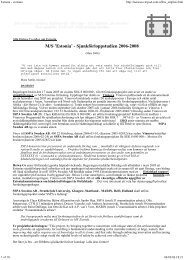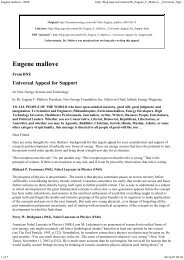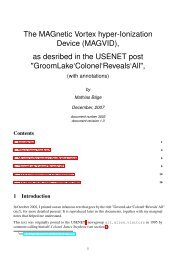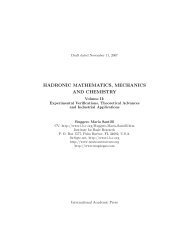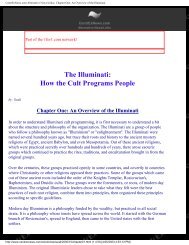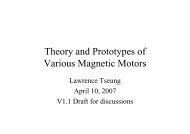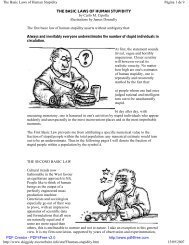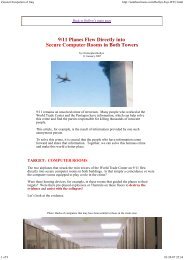Create successful ePaper yourself
Turn your PDF publications into a flip-book with our unique Google optimized e-Paper software.
<strong>TBR</strong><strong>News</strong>.org http://blog.lege.net/content/TheVoiceOfTheWhiteHouse<strong>2008</strong>08<strong>18</strong>.html<br />
The CIA has in fact been closely involved in Georgia since the Soviet collapse. But<br />
under the Bush administration, Georgia has become a fully fledged US satellite. Georgia’s forces<br />
are armed and trained by the US and Israel. It has the third-largest military contingent in Iraq -<br />
hence the US need to airlift 800 of them back to fight the Russians at the weekend. Saakashvili’s<br />
links with the neoconservatives in Washington are particularly close: the lobbying firm headed by<br />
US Republican candidate John McCain’s top foreign policy adviser, Randy Scheunemann, has<br />
been paid nearly $900,000 by the Georgian government since 2004.<br />
But underlying the conflict of the past week has also been the Bush administration’s<br />
wider, explicit determination to enforce US global hegemony and prevent any regional challenge,<br />
particularly from a resurgent Russia. That aim was first spelled out when Cheney was defence<br />
secretary under Bush’s father, but its full impact has only been felt as Russia has begun to recover<br />
from the disintegration of the 1990s.<br />
Over the past decade, NATO’s relentless eastward expansion has brought the western<br />
military alliance hard up against Russia’s borders and deep into former Soviet territory. American<br />
military bases have spread across eastern Europe and central Asia, as the US has helped install one<br />
anti-Russian client government after another through a series of colour-coded revolutions. Now<br />
the Bush administration is preparing to site a missile defence system in eastern Europe<br />
transparently targeted at Russia.<br />
By any sensible reckoning, this is not a story of Russian aggression, but of US imperial<br />
expansion and ever tighter encirclement of Russia by a potentially hostile power. That a stronger<br />
Russia has now used the South Ossetian imbroglio to put a check on that expansion should hardly<br />
come as a surprise. What is harder to work out is why Saakashvili launched last week’s attack and<br />
whether he was given any encouragement by his friends in Washington.<br />
If so, it has spectacularly backfired, at savage human cost. And despite Bush’s attempts<br />
to talk tough yesterday, the war has also exposed the limits of US power in the region. As long as<br />
Georgia proper’s independence is respected - best protected by opting for neutrality - that should<br />
be no bad thing. Unipolar domination of the world has squeezed the space for genuine<br />
self-determination and the return of some counterweight has to be welcome. But the process of<br />
adjustment also brings huge dangers. If Georgia had been a member of NATO, this week’s<br />
conflict would have risked a far sharper escalation. That would be even more obvious in the case<br />
of Ukraine - which yesterday gave a warning of the potential for future confrontation when its<br />
pro-western president threatened to restrict the movement of Russian ships in and out of their<br />
Crimean base in Sevastopol. As great power conflict returns, South Ossetia is likely to be only a<br />
taste of things to come.<br />
The bear is back!<br />
<strong>August</strong> 16, <strong>2008</strong><br />
by Richard M Bennett<br />
Asia Times<br />
Despite being rather moth-eaten and while still missing a claw or two, the Russian bear<br />
is definitely back in business.<br />
The conflict with Georgia over its troublesome breakaway provinces has as much to do<br />
with nationalistic pride and the Kremlin’s wish to reassert itself on the international scene as a<br />
determination to protect the predominately Russian citizens of South Ossetia or the determinedly<br />
independent-minded Abkhazians.<br />
Despite constant assertions by Washington that Russia risks isolation for its military<br />
actions of the past week, it is arguable that it is the United States itself that faces the greatest<br />
dilemma.<br />
To enforce any form of diplomatic or economic "punishment" on the Russians,<br />
Washington desperately needs the wholehearted support of the international community and its<br />
closest allies in particular.<br />
For a variety of reasons, this might not be forthcoming.<br />
The former communist countries of Eastern Europe and Central Asia are increasingly<br />
and rightly wary of the growing confidence of Russia’s leadership and the resurgence of Russian<br />
military capability.<br />
Western Europe remains significantly reliant on Russian energy supplies and<br />
8 of 24 08/19/08 13:13



